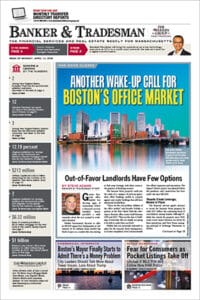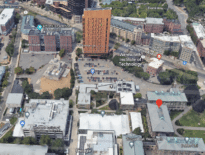The failures of Silicon Valley Bank and Signature Bank have prompted some local banks to post online and social media messages about their differences from these banks and the unique insurance fund that protects all deposits at almost three-quarters of Massachusetts-based banks.
Michael Jones, president and CEO of Newburyport-based Institution for Savings, posted a letter online to customers stating that the bank was stable and secure, adding that it was also well-capitalized.
“Our financial model and conservative business strategy are very different than what you have heard and read in headlines this past weekend,” Jones said in the letter. “We are a strong, thriving mutual bank that serves our depositors, not stockholders.”
Lisa Oliver, president and CEO of The Cooperative Bank of Cape Cod, noted in a letter to customers yesterday that Silicon Valley Bank’s business model was “strikingly different” from how The Coop operates.
“The Coop is a well-capitalized, financially sound, community bank with a diversified asset base, managed by an expert and experienced team of banking executives and dedicated board members,” Oliver said. “We have always and will continue to provide a safe and reliable place for our friends, neighbors and community members to bank.”
James Anthony, president and CEO of Martha’s Vineyard Bank, said in a letter emailed on Saturday that the bank had “a strong capital position, robust liquidity, a traditional business model, and pristine asset quality.”
He also pointed out that the bank had received an “outstanding” rating on its Community Reinvestment Act examination.
“To be clear and to allay any fear, these events have no effect on Martha’s Vineyard Bank,” Anthony said in the letter. “These failures involved banks that operate very differently from Martha’s Vineyard Bank. Indeed, their collapse emphasizes the importance of entrusting your deposits with a bank that provides the maximum possible protections.”
These banks, and several others, also referenced their membership in the Depositors Insurance Fund, the industry-sponsored fund in Massachusetts that insures balances at member banks above the $250,000 FDIC limit.
The DIF, the only fund in the U.S. offering insurance on excess deposit amounts, has 74 members, all Massachusetts-based banks, said Andrew Calamare, president and CEO of the DIF. Calamare told Banker & Tradesman that of the combined deposits at the member banks, 70 percent are insured by the FDIC, and the remaining deposits are insure by the DIF.
Member banks range in size from $89 million in assets to $4.9 billion in assets, Calamare said, with $1.2 billion as the average asset size for a member bank.
Calamare, who was the Massachusetts banking commissioner from 1987-1990, said he was pleased with the federal response to the bank failures in recent days.
“We work very closely with state and federal bank regulators,” Calamare said. “We’ve been through a number of very volatile economic cycles since we were established in 1934, and nobody has lost a dime,”







